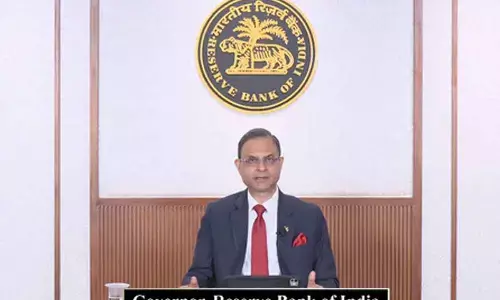Want to be an entrepreneur?

It's a myth that hard work is the key to success in businesses. Calculative risks is what differentiates successful businesses from the rest
Over a year ago, Covid-19 shook the world off its roots, triggering fears and insecurities across sectors. The world witnessed one of the worst economic deceleration of the millennium as majority of the businesses were not prepared for a global recession so harsh. But this is not the end. The pandemic has in many ways, redirected people to reanalyse their priorities and goals in life.
If you are an entrepreneur or aspire to be one, here are some tips for you:
Never stop trying
Whether we are at the bar drinking or taking a leak during a washroom break or watching random videos online, ideas are magical and yet not so hard to produce. The human mind is full of ideas, ideas that have the power to disrupt the world. What people lack is the motivation and drive to pursue them.
People are often found to dismiss their own ideas or quit midway through the process if they have already started. It is very common for people to always undermine their ideas and they usually delay the start because they feel their ideas lack substance.
Giving up is the enemy of creativity. Persistence after getting started is always undervalued. It's really difficult to know how good or bad an idea is until you actually start working on it. Once an idea is there, a problem is identified, it's best to pen down the problem statement.
A problem statement has to be strong because it is the heart and soul of your start-up idea, it's the statement that attracts stakeholders to link with the start-up, it's the statement that the stakeholders consider the focal point and build along. The blueprint that a start-up builds with the problem statement as the focal point has to be fundamentally strong as it forms the solution statement which forms the vision and gives clear direction to the start-up. For a business to be successful, it has to have a strong problem statement and an equally strong and confident solution. That is it.
Risk and hope
Entrepreneurship never comes easy. When one chooses to be an entrepreneur, before the glitz and glamour, comes the rough road of struggles, sacrifices and risks. Entrepreneurship comes with loads and tons of risks, financial risks that might result in surviving on a couple of packets of maggi a day or reputational risks that might lead to friends and family constantly getting on the nerves with infuriating questions. While risk is crucial when you are starting up, risks should never be wild.
As exciting it might sound to take wild risks with no flooring, risks should always be practical and calculative. Calculative risks is what differentiates successful businesses from the rest of the lot. Risk takers usually do not think of exit routes or factors that make a decision risky. That is the reason most of them fail.
It's better to know the odds when making a decision and once you have already taken the plunge, just keep putting in work and always hope for the best. Hope is what keeps you pushing when the light of acceptance is not visible in the tunnel of start-ups. Hope drives most of the productivity in the start-up culture. When the basis of hope is real world experience, knowledge and data, then the risks become calculated risks and then the hope transforms into 'trust' and that is powerful. Keep hoping for the best while preparing for the worst. Risk and hope move hands in hand.
Curiosity and persistence fuel opportunities
Entrepreneurs have a reputation of putting in long hours and working super hard. It's a myth that hard work is the key to success in businesses. we all have instances where we have worked so hard in school projects and still lost on the grades. Hard work is nothing but an expression to glorify a person's efforts.
One should focus more on working smart and enjoying the pursuit, it's the curiosity and persistence towards the product that runs the game.
An entrepreneur needs to take baby steps while approaching a problem. S/he needs to show commitment, and with the right intention and persistence, there is no problem a business cannot solve.
In a start-up space, you never see instant success. So there is no motivation to wake up the next day to go back and do the same thing again. That is when persistence kicks in; it has to cover up for the little pat on the back that an entrepreneur craves for. Persistence drives businesses. Persistence builds businesses like no one else.
Getting to an office space post Covid
When anybody imagines a new age start-up, they probably imagine an office space with a bunch of people having constant creative brainstorming sessions, loads and tons of meetings and interactions. It might be an amazing sight to imagine, but with early stage start-ups, it's more of a fight of survival.
Start-ups need money. Not having enough money or it being budgeted to other things can hamper or slow down important progress such as hiring the right human resource, getting products out on time or even marketing it the right way. Necessity is the mother of all innovation.
Covid-19 forced employees to work from home and deliver equally well, the workplace we all knew of is very frankly not a thing anymore.
Working from home comes with an opportunity to save cost for the company.
Apart from the money it saves, it also saves the time and energy it takes for employees to commute and reach the workplace. This saved time and energy can be used to prioritise bigger and more important issues at the workplace. Working remotely from home saves a massive overhead cost for the company. And if employees show ownership, delivery quality and right on time, there is no harm in keeping the whole thing remote.
Fishing and nurturing the dream team
A start-up idea is futile without the people working behind the curtains. As a founder, one might have the biggest of dreams with the perfect vision for your company, but it's the team which will help achieve that.
Nothing matters more than the team that is helping to run stuff on a daily basis. It is the team which finally has to execute the 'best laid plans' to determine itss fate. The team is responsible for working on the vision and goals by breaking it into smaller bits and chunks and destroying them every-day.
Since most start-ups struggle with the challenges of having limited resources, it's important for the team to take ownership and be open to working sideways. There are high chances that a marketing guy would be doing budgets or speaking to the inventory people. The success or failure of your start-up directly depends on the promoter's ability to attract and keep talent.
Establishing great people in leadership roles is half the battle won; the other half they will win as a team for the organisation. An entrepreneur should nurture a culture where the team is not scared to talk and everybody is open to both resistance and appreciation.
Micro management is discouraged in the organisation and people should be only expected to show ownership and work as per their comfort.
Getting in funding should be more than what the investors brought in. An entrepreneur should be more keen to get investors who have aligned interests and skills that can help a start-up to climb up the ladder.
Opportunities during uncertain times
Rather than looking at uncertainties as threats, an entrepreneur should look at them as opportunities. Uncertain times are hard, very hard, but the opportunities they hold are massive, really massive.
Society on a global level was forced to rethink how it had been doing things, come up with new and innovative things to do the same things in a better way. In the middle of chaos, there also lies opportunity.
A business can keep doing what it was doing earlier, it can keep solving the same problems or try and address new problems created during the pandemic. A business does not have to be a product of the circumstances; it's built in, rather it should be a product of the decisions that built it.
(The author is the Co-founder and COO of CiS App, a social networking venture)








